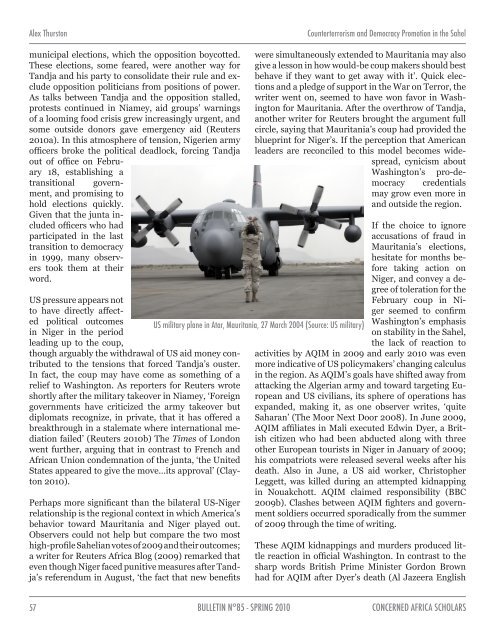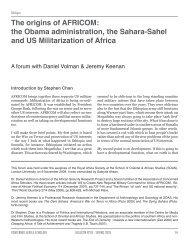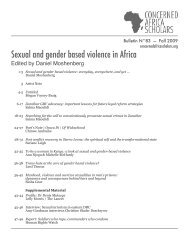Western Sahara and the United States' geographical imaginings
Western Sahara and the United States' geographical imaginings
Western Sahara and the United States' geographical imaginings
Create successful ePaper yourself
Turn your PDF publications into a flip-book with our unique Google optimized e-Paper software.
Alex Thurston Counterterrorism <strong>and</strong> Democracy Promotion in <strong>the</strong> Sahel<br />
municipal elections, which <strong>the</strong> opposition boycotted.<br />
These elections, some feared, were ano<strong>the</strong>r way for<br />
T<strong>and</strong>ja <strong>and</strong> his party to consolidate <strong>the</strong>ir rule <strong>and</strong> exclude<br />
opposition politicians from positions of power.<br />
As talks between T<strong>and</strong>ja <strong>and</strong> <strong>the</strong> opposition stalled,<br />
protests continued in Niamey, aid groups’ warnings<br />
of a looming food crisis grew increasingly urgent, <strong>and</strong><br />
some outside donors gave emergency aid (Reuters<br />
2010a). In this atmosphere of tension, Nigerien army<br />
officers broke <strong>the</strong> political deadlock, forcing T<strong>and</strong>ja<br />
out of office on February<br />
18, establishing a<br />
transitional government,<br />
<strong>and</strong> promising to<br />
hold elections quickly.<br />
Given that <strong>the</strong> junta included<br />
officers who had<br />
participated in <strong>the</strong> last<br />
transition to democracy<br />
in 1999, many observers<br />
took <strong>the</strong>m at <strong>the</strong>ir<br />
word.<br />
US pressure appears not<br />
to have directly affected<br />
political outcomes<br />
in Niger in <strong>the</strong> period<br />
leading up to <strong>the</strong> coup,<br />
though arguably <strong>the</strong> withdrawal of US aid money contributed<br />
to <strong>the</strong> tensions that forced T<strong>and</strong>ja’s ouster.<br />
In fact, <strong>the</strong> coup may have come as something of a<br />
relief to Washington. As reporters for Reuters wrote<br />
shortly after <strong>the</strong> military takeover in Niamey, ‘Foreign<br />
governments have criticized <strong>the</strong> army takeover but<br />
diplomats recognize, in private, that it has offered a<br />
breakthrough in a stalemate where international mediation<br />
failed’ (Reuters 2010b) The Times of London<br />
went fur<strong>the</strong>r, arguing that in contrast to French <strong>and</strong><br />
African Union condemnation of <strong>the</strong> junta, ‘<strong>the</strong> <strong>United</strong><br />
States appeared to give <strong>the</strong> move…its approval’ (Clayton<br />
2010).<br />
Perhaps more significant than <strong>the</strong> bilateral US-Niger<br />
relationship is <strong>the</strong> regional context in which America’s<br />
behavior toward Mauritania <strong>and</strong> Niger played out.<br />
Observers could not help but compare <strong>the</strong> two most<br />
high-profile Sahelian votes of 2009 <strong>and</strong> <strong>the</strong>ir outcomes;<br />
a writer for Reuters Africa Blog (2009) remarked that<br />
even though Niger faced punitive measures after T<strong>and</strong>ja’s<br />
referendum in August, ‘<strong>the</strong> fact that new benefits<br />
5<br />
BULLETIN N°85 - SPRING 2010<br />
were simultaneously extended to Mauritania may also<br />
give a lesson in how would-be coup makers should best<br />
behave if <strong>the</strong>y want to get away with it’. Quick elections<br />
<strong>and</strong> a pledge of support in <strong>the</strong> War on Terror, <strong>the</strong><br />
writer went on, seemed to have won favor in Washington<br />
for Mauritania. After <strong>the</strong> overthrow of T<strong>and</strong>ja,<br />
ano<strong>the</strong>r writer for Reuters brought <strong>the</strong> argument full<br />
circle, saying that Mauritania’s coup had provided <strong>the</strong><br />
blueprint for Niger’s. If <strong>the</strong> perception that American<br />
leaders are reconciled to this model becomes widespread,<br />
cynicism about<br />
Washington’s pro-democracy<br />
credentials<br />
may grow even more in<br />
<strong>and</strong> outside <strong>the</strong> region.<br />
If <strong>the</strong> choice to ignore<br />
accusations of fraud in<br />
Mauritania’s elections,<br />
hesitate for months before<br />
taking action on<br />
Niger, <strong>and</strong> convey a degree<br />
of toleration for <strong>the</strong><br />
February coup in Niger<br />
seemed to confirm<br />
Washington’s emphasis<br />
on stability in <strong>the</strong> Sahel,<br />
<strong>the</strong> lack of reaction to<br />
activities by AQIM in 2009 <strong>and</strong> early 2010 was even<br />
more indicative of US policymakers’ changing calculus<br />
in <strong>the</strong> region. As AQIM’s goals have shifted away from<br />
attacking <strong>the</strong> Algerian army <strong>and</strong> toward targeting European<br />
<strong>and</strong> US civilians, its sphere of operations has<br />
exp<strong>and</strong>ed, making it, as one observer writes, ‘quite<br />
<strong>Sahara</strong>n’ (The Moor Next Door 2008). In June 2009,<br />
AQIM affiliates in Mali executed Edwin Dyer, a British<br />
citizen who had been abducted along with three<br />
o<strong>the</strong>r European tourists in Niger in January of 2009;<br />
his compatriots were released several weeks after his<br />
death. Also in June, a US aid worker, Christopher<br />
Leggett, was killed during an attempted kidnapping<br />
in Nouakchott. AQIM claimed responsibility (BBC<br />
2009b). Clashes between AQIM fighters <strong>and</strong> government<br />
soldiers occurred sporadically from <strong>the</strong> summer<br />
of 2009 through <strong>the</strong> time of writing.<br />
US military plane in Atar, Mauritania, 27 March 2004 (Source: US military)<br />
These AQIM kidnappings <strong>and</strong> murders produced little<br />
reaction in official Washington. In contrast to <strong>the</strong><br />
sharp words British Prime Minister Gordon Brown<br />
had for AQIM after Dyer’s death (Al Jazeera English<br />
CONCERNED AFRICA SCHOLARS




